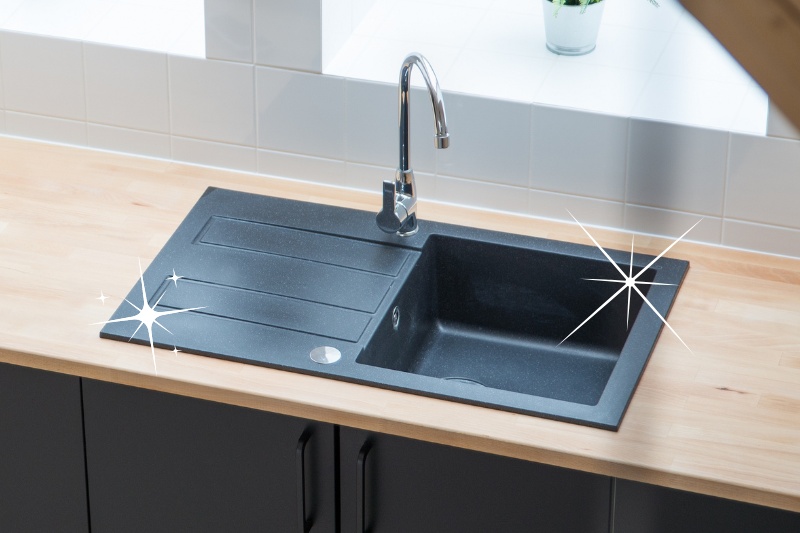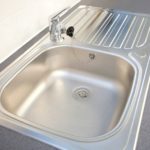Composite sinks are uber-practical. They’re durable, good-looking, and, as we’ll see here, simplicity itself to clean. In fact, it’s normally the case that a quick rinse will have your black composite sink looking back to its best.
However, if you’ve got a basin blemish that laughs in the face of rinsing, don’t panic. Just read on. That stain’s history.
But first, a warning.
Things to Avoid When Cleaning Composite Sinks
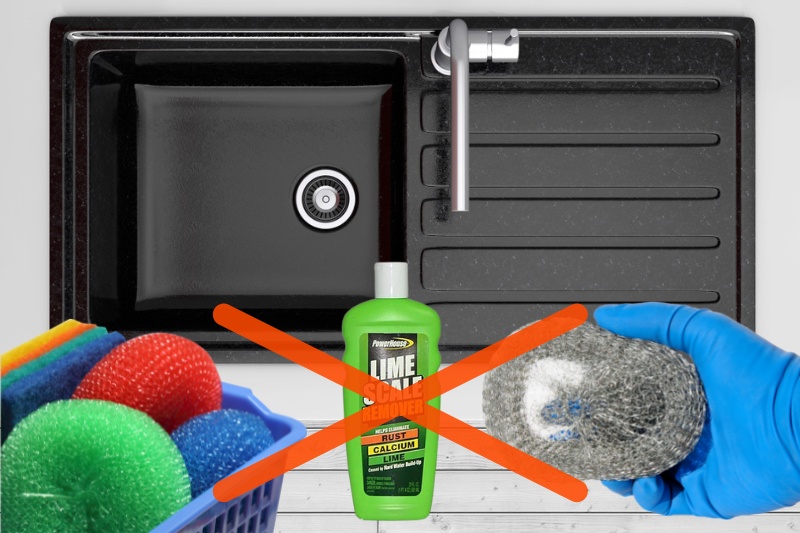
With a standard stainless steel or porcelain sink, you can use most standard cleaning products to bring back those shiny moments. But a composite sink demands special treatment.
Don’t worry—we’re not talking being sprayed with atomised gold then buffed with dodo feathers. Not that special.
The important thing is to avoid harsh cleaners, which can be too acidic or alkaline for your composite’s sensitive parts.
You should also avoid limescale removers and abrasive scrubbers. Your composite sink simply won’t stand for them.
What to Use to Clean a Black Composite Sink
White vinegar
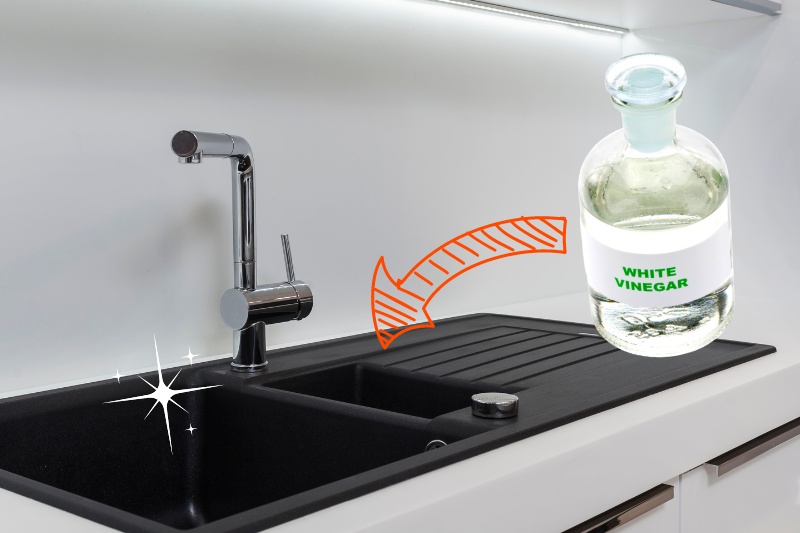
Good old vinegar. Where would we be without it? In a world full of stains, or harsh chemicals, or both.
The great thing about vinegar is how very harmless it is to us and our environment. And it’s cheap. And it’s readily available.
If you don’t like the smell of vinegar, you can always tackle the aroma with a few drops of essential oil. Lavender’s an excellent choice.
So, how do you clean a sink with vinegar? Get some white vinegar, put it in a spray bottle with water (50:50 should do it) and give that sink a good spraying, all over. Then wipe down with a microfibre cloth.
You should find that vinegar will keep your sink looking sensational. But for stains that don’t respond, you might want to try one of the following methods.
Washing up liquid
A little squirt of washing up liquid (called dish soap, by some) into a cloth will work wonders with soap stains. Just make sure that the washing up liquid you use doesn’t contain bleach or any enzymes that might chomp their way into your sink’s surfaces.
Bicarbonate of soda
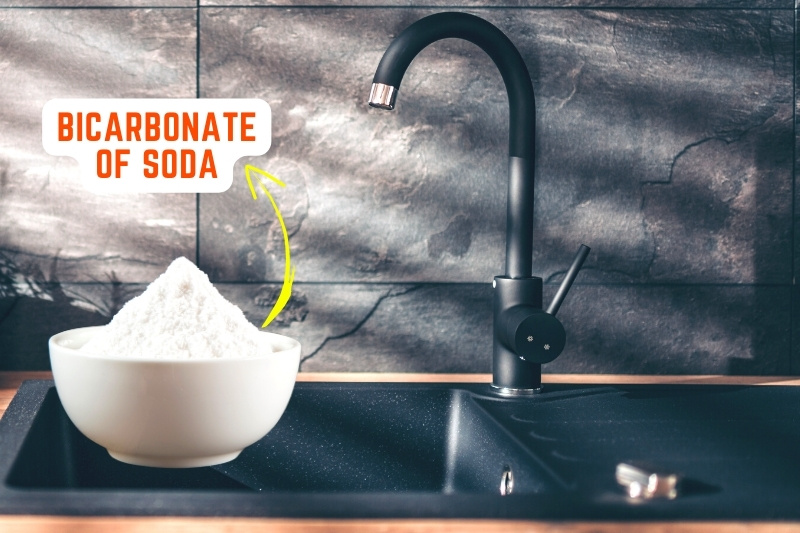
White haze. One of Jimi Hendrix’s less colourful recordings? No. It’s what you get in hard water areas. It’s limescale build-up and it’s a pain at the best of times.
On a black composite sink it’s much worse because a) nothing enables white to really stand out like a black background, and b) you can’t use limescale remover on it. So, what to do? You turn to one of your pantry’s mega-stars in the cleaning game: bicarbonate of soda.
Sprinkle some of this miraculous stuff onto the scale and leave for about 30 seconds. Then, using your trusty microfibre cloth, wipe it down.
Like a charmingly cheeky but fundamentally inoffensive guest, what bicarb brings to the party is just enough abrasiveness to work on the scale but not enough to scratch the sink.
Finally, for really nasty stains, bicarb just loves getting it on with a touch of vinegar—together they are the fizzness. Once the bubbles subside and you wipe the mixture away, you should find that your basin’s back to its best.
Mineral oil
Come again? No, not everyone knows what mineral oil is. It’s a by-product of the oil industry, and is used for all manner of purposes, including seasoning pans and treating boards. In fact, it’s often-called chopping board oil. If you don’t have mineral oil, you can use olive oil instead.
If you apply a little oil to a cloth and wipe quickly around the sink every 4-6 weeks, you’ll keep it as glossy-looking as a singularly well-wardrobed WAG.
Top Tips for a Cleaner Sink
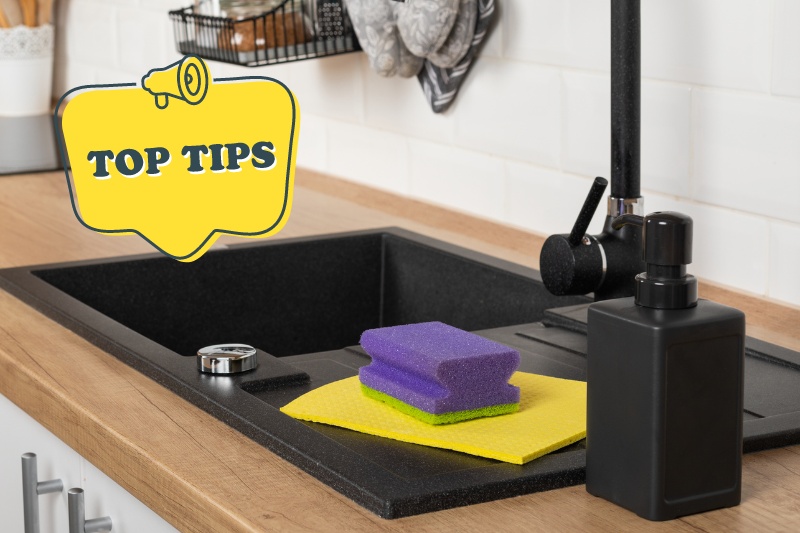
Are black composite sinks hard to keep clean? No, they’re not. Follow these and you may not end up having to put so much effort into cleaning that sink in the first place.
1. Don’t leave water in it
Water’s not as friendly as it seems. Leave it to settle in your sink and you’ll see it for the scaly schemer it really is. Leaving water in your sink can lead to limescale build-up.
Your sink’s sleek black looks can start to fade too, as water proceeds to do its discolouration thing.
Make sure water it drains out fully when you’ve finished washing the dishes. Feel free to wipe around a little to banish those last drops.
When doing so, don’t use a scourer, as it could damage the sink. Whatever you do, don’t use anything more abrasive than a soft cloth on a composite sink.
2. Clean it every day
Don’t let grime build up. Do the bright thing and give that sink a good old wipe down every single day. It deserves nothing less. And your life will be so much easier. Little and often. It’s the way forward.
What to Do If You’ve Scratched a Black Composite Sink
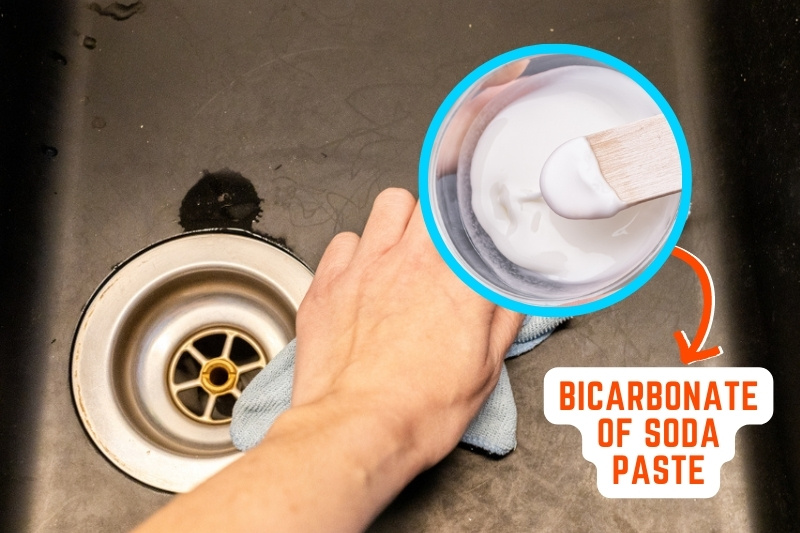
Some cleaners are so abrasive that they’ll make mincemeat of your poor composite sink. If this should happen, don’t worry. Follow these steps.
Then hide the abrasive stuff away somewhere in a galaxy far, far away where not even you can find it.
Step 1: Bring on the bicarb
Just like when Han and Chewie suddenly appear and take out those pesky TIE fighters following Luke down the Death Star trench, sometimes it’s great to see an old friend coming back to do what only they can do. Yes, it’s time for the bicarbonate of soda to perform.
Make a paste with bicarb and warm water, and apply it to the scratched bits.
Step 2: Leave it to chill
Just like Han when he gets carbon-frozen, that paste needs to be left alone for about 12 hours.
Step 3: Rinse and dry
No Star Wars reference here. Just rinse and dry. That’s it. Alright then, if you insist, like when Obi-Wan washes his hands before sitting down to his lunch.
Step 4: Buff it up
Get that mineral oil and give that basin a good old buffing till it shines like C-3PO after his annual service.

Martin’s life revolves around films, dogs and food, but rarely all at the same time. At least two out of these three like to give clothes and furniture a hard time, and Martin enjoys discovering and writing about new ways to stop them doing their worst.
